Jared Goff Projects to Stardom
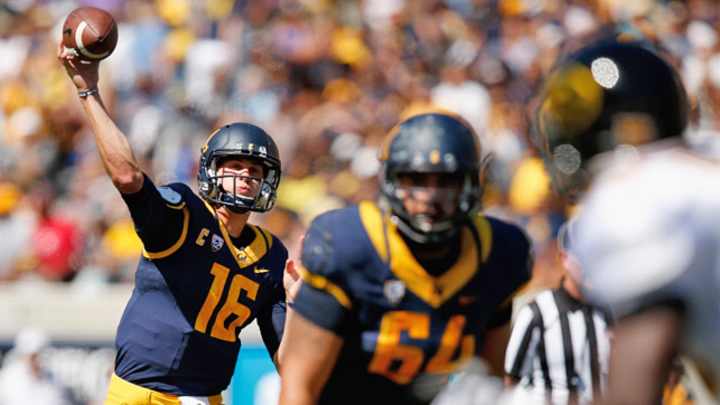
Last week I got a call from The MMQB’s head honcho, Peter King. He was assigning me something “outside my comfort zone.” (Perfect.) I was to study film of the Cal Bears’ offense. My devotion to football lies pretty much entirely with the NFL, but with Goff being the (very early) projected first pick in the 2016 draft, he seemed to be a worthwhile diversion.
I obtained coaches’ film DVDs of three Cal games: the road victory over Texas, the home win over Washington State and the road loss to Utah.
Halfway through the WSU contest, my chagrin evaporated. The film studying process always starts out slow and somewhat choppy—especially if you’re watching a player you’ve never seen before. But inevitably, a point comes when everything clicks. Your perception of the player crystalizes, and suddenly his attributes appear clear.
It was exciting when this happened with Goff. Watching him carve the Cougars, the phrase “similarities to Andrew Luck” went in my notes multiple times. Unaware of the rest of the college football landscape, I can’t say whether Goff deserves to be the first pick in next year’s draft. But I can say that having studied almost every snap of each NFL quarterback this season, Goff irrefutably projects to stardom. So before the tedium of the combine and pro days and 24/7 draft coverage starts to muddy the picture, here’s the breakdown of Goff’s pro prospects based solely on what actually matters: his film.
* * *
First, let’s address the similarities to Luck. They reside primarily in the fact that Goff is an accurate passer, particularly on arcing throws outside the numbers. He doesn’t quite have a cannon, but like Luck he puts the exact amount of mustard that each pass demands. He truly can “make all the throws,” as scouts say. He was very good dropping balls into the deep-intermediate outside voids of Cover 2. He worked seam passes comfortably over the linebacker and in front of the safety. Hitting moving targets was not a problem.
But for high-level NFL quarterbacking, accuracy and arm strength are merely prerequisites; rarely are they alone difference-making elements. (Jay Cutler’s past coaches would solemnly agree.) A quality QB also needs to have a commanding feel for the pocket. Here Goff is very good. He consistently keeps his eyes downfield, never looking at the rush. You can call this another similarity to Luck. However, Goff is not quite as athletic as Luck, and it shows in how he moves within the pocket.
Athleticism within the pocket, however, is not remotely as important as fundamentals. Goff checks all the boxes on this sheet. He steps and slides effortlessly behind his offensive line. His throwing mechanics do not waiver, regardless of how much movement precedes them. Because of this, Goff (who is right-handed) is also proficient throwing outside the pocket, be it moving to his left or right.
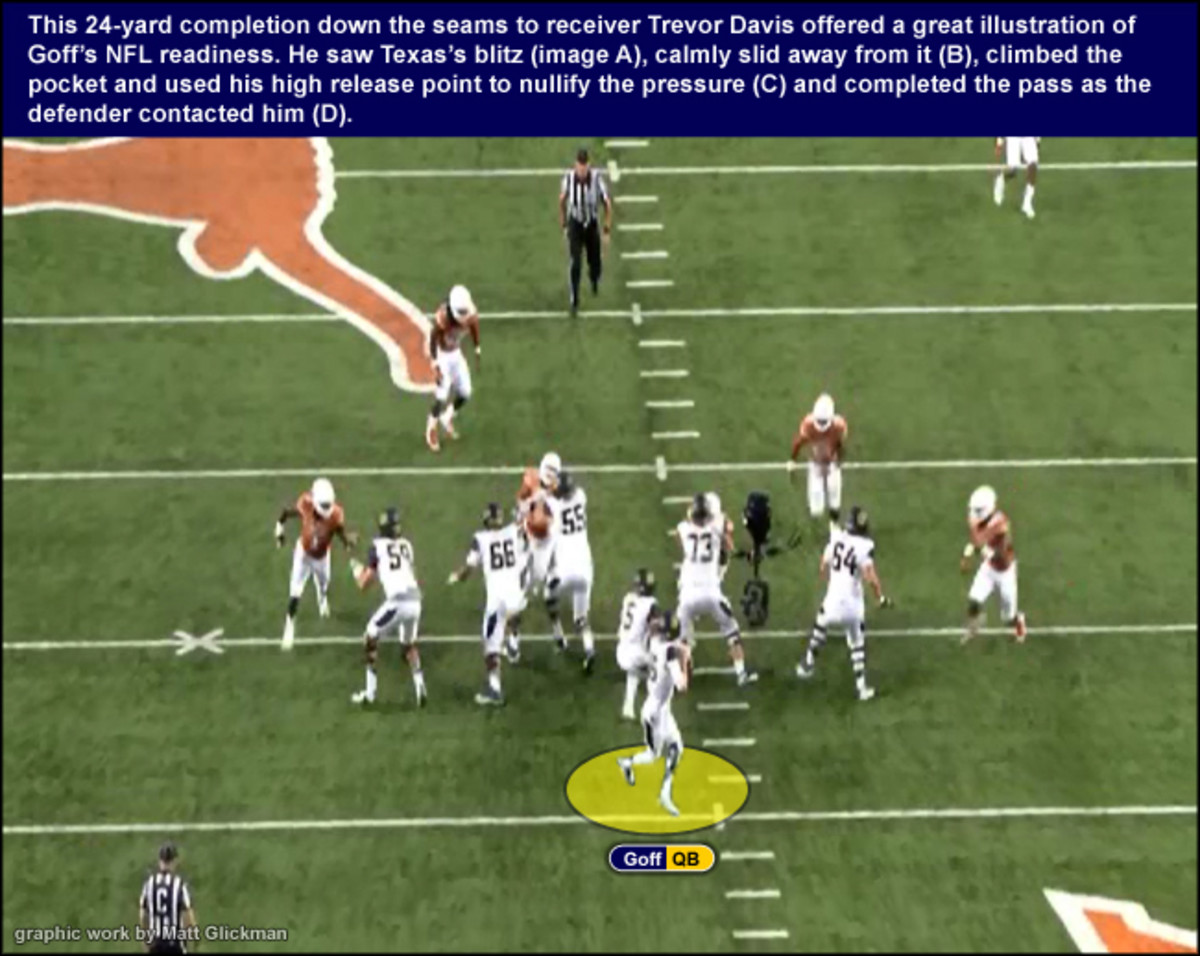
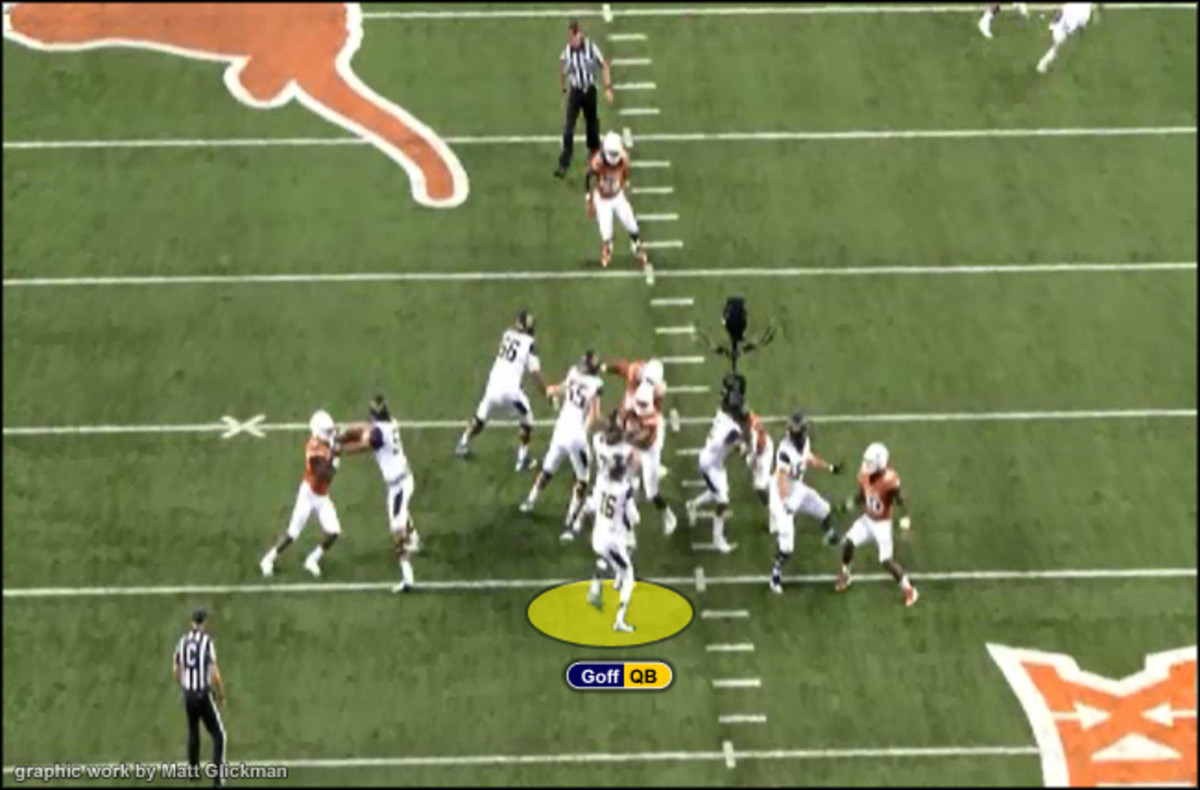
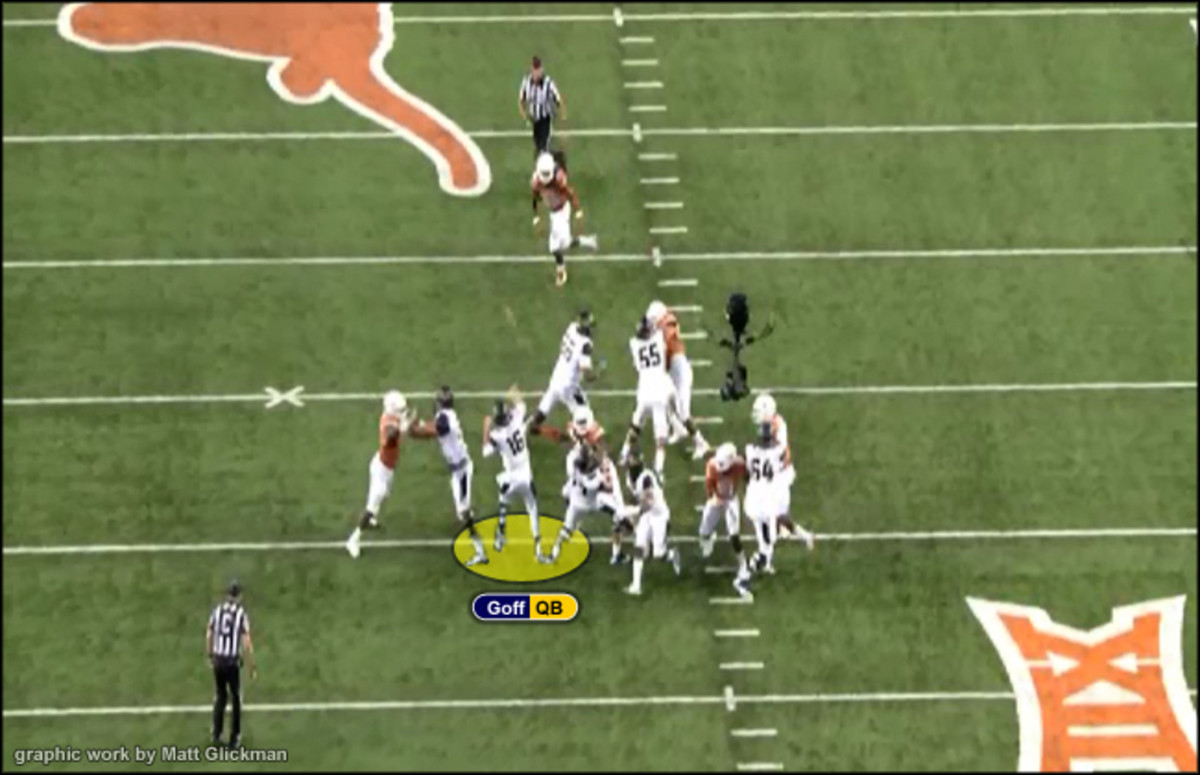
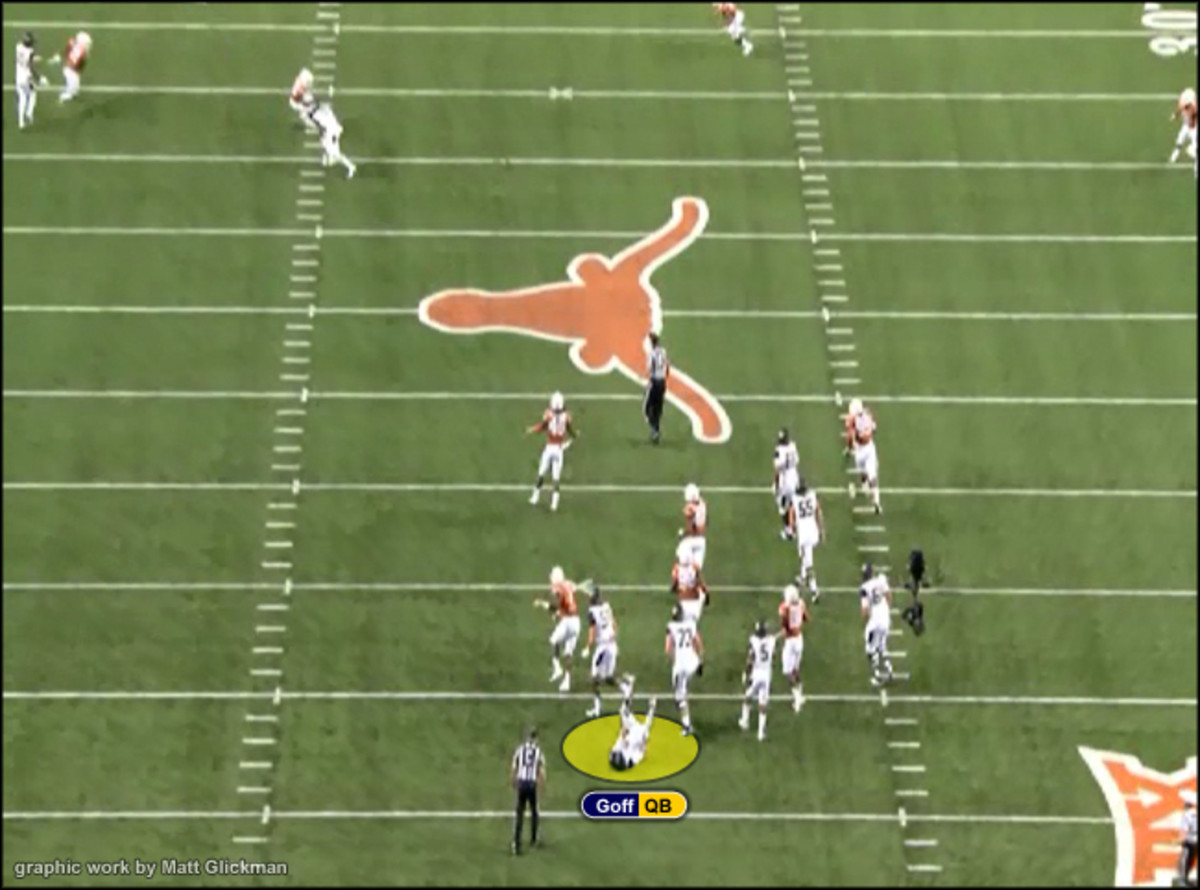
Not surprising for a guy with deft footwork, the effortlessness of Goff’s pocket movement is matched by the effortlessness with which he throws the ball. He has a high release point, which aids ball security and improves the quickness with which the ball leaves his hand. He’s not necessarily Aaron Rodgers when it comes to quickness and compactness in release (perhaps nobody save for Dan Marino has been). If forced to draw a parallel, one might say Goff’s release is similar to Carson Palmer’s.
What stood out most was how “on balance” Goff was in all facets. His effortless movement was backed by feet that were strong and solid but never heavy. When he was forced to throw off-balance and from weird platforms—something that happens regularly in the NFL—the sturdiness of his feet, and therefore the integrity of his mechanics, did not disappear. In fact, Goff often made subtle adjustments in these scenarios. This suggests that he can learn to throw from a crowded pocket—a challenge the NFL demands but Cal’s spread-oriented offense does not often present.
• FILM STUDY WITH JASON WITTEN: The future Hall of Famer breaks down every aspect of his game.
* * *
Impressive as Goff was, there were flaws. In the Utah game he threw five interceptions. The first two were his receiver’s fault, and the fourth was a backfield screen gone awry. But the third and fifth picks were poor quarterbacking. The third was the rare instance in which Goff’s footwork did get away from him; his ball sailed high. On the fifth, Goff had no room to step up and make a throw, but he tried to anyway. The pass fluttered at least 10 yards short; the man-to-man defender who caught the ball practically had time to tighten his gloves while waiting on it.
Goff also threw an interception in the Washington State game. It was into the teeth of a Cover 2 trap, a disguised coverage in which the cornerback initially appears to be carrying the outside receiver downfield but is actually peeling back and settling into an outside zone in order to take away a quick-out by the slot receiver. (This is the same coverage that used to give Tony Romo trouble late in games.) Encouragingly, when Goff saw this coverage later in the contest, he pulled the ball down and wound up throwing it away. Sometimes a quarterback’s best plays are in the throws he doesn’t make—a key part of the position that no statistic, no matter how advanced, will ever capture. Discouragingly, when Goff saw Cover 2 trap a third time, later in the game, he threw back into it.
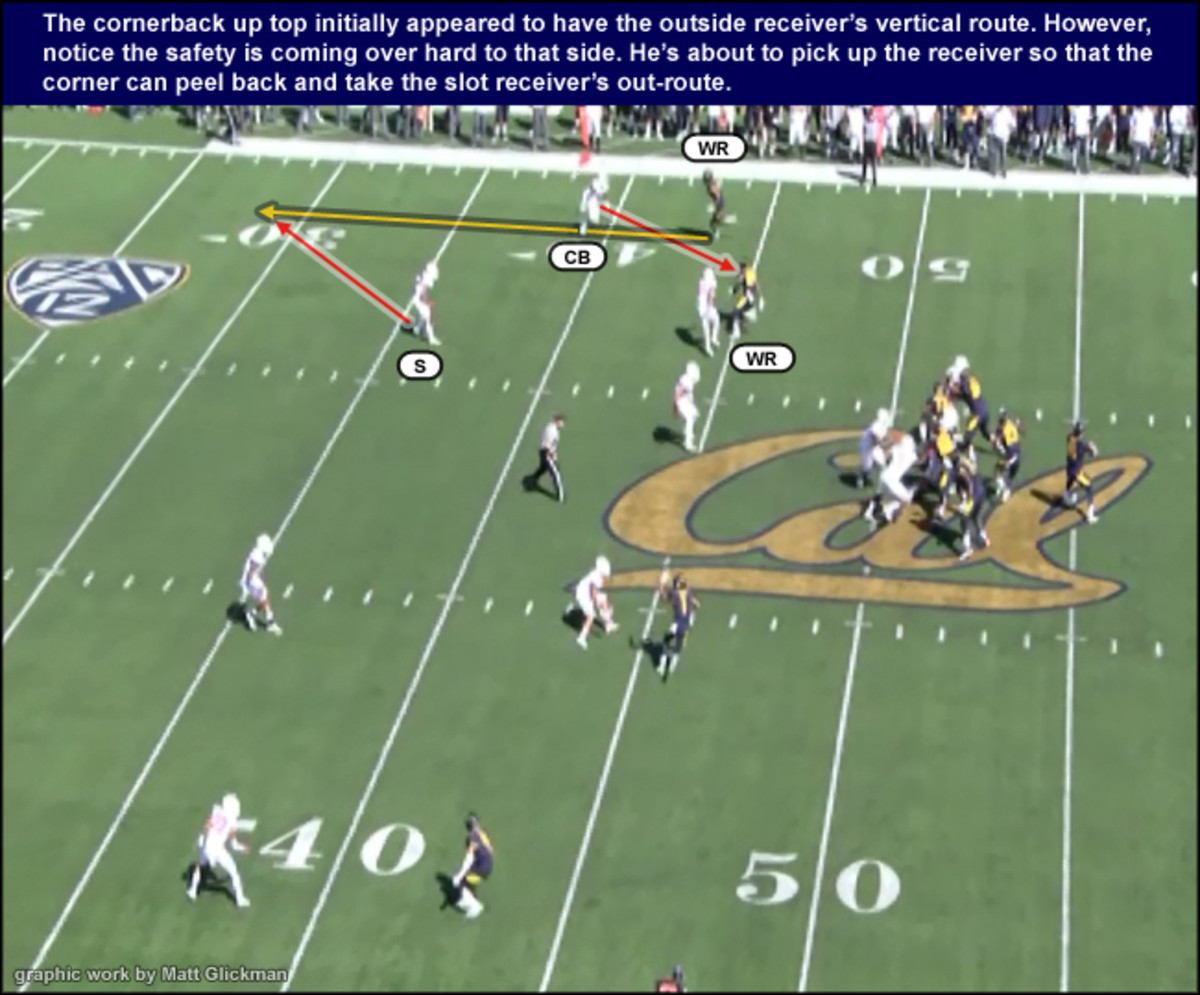
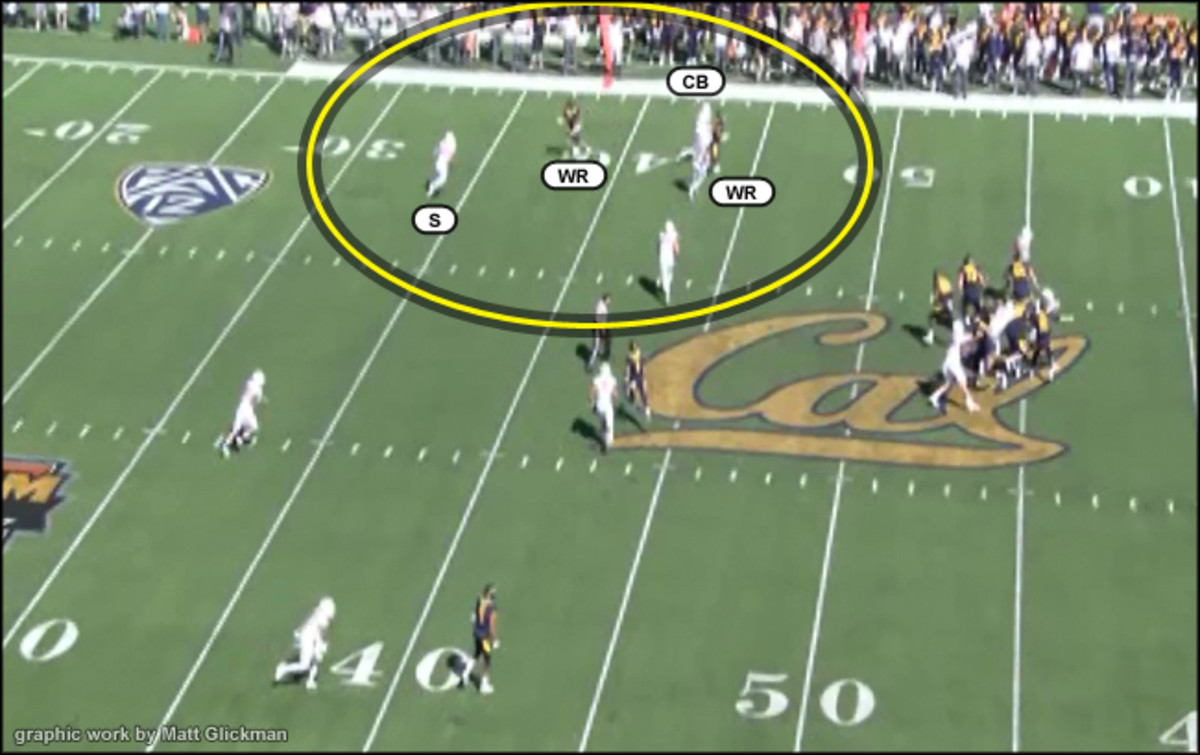
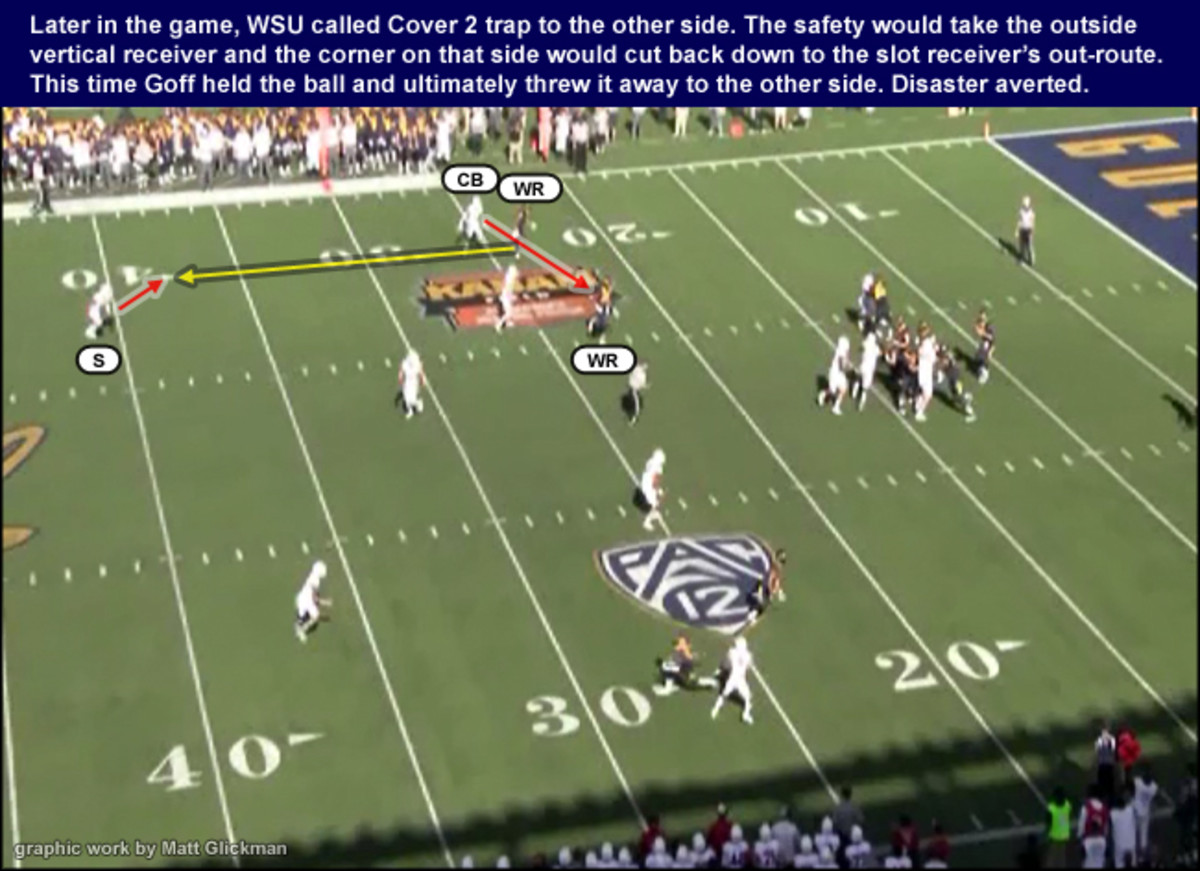
As far as an overall ability to read the field, there’s still a bit to be determined with Goff because in Cal’s system the ball was so often out on a three-step drop. Then again, that’s the nature of many NFL passing offenses these days. And so is the threat of a read-option, which Cal’s shotgun-based zone rushing attack presented. Goff regularly handed off on the read-option looks. But like an Andy Dalton, an Alex Smith or a Derek Carr, he’s mobile enough to run for 20 yards if the defense doesn’t honor him.
Goff won’t have to play in a shotgun-based system in the pros. Though again, like the quick-timing spread concepts, this too has become the NFL’s norm. But the point is, Goff has a diverse enough set of skills to operate out of just about any scheme. To finish up on Peter’s instructions and project which scheme would be the best fit for Goff… obviously Chip Kelly’s in Philadelphia makes sense, and based on Sam Bradford’s first six games the Eagles could very well be in the market for a new QB. That would likely require a significant trade up in the draft, however. Projecting which of the likely top pick teams would fit Goff becomes challenging because many of those teams will, thanks to their efforts in earning a top draft choice, have a new coaching staff in 2016 anyway.
One potential top pick team that won’t have a new staff is Chicago. Stylistically, Goff would be a great fit in offensive coordinator Adam Gase’s system. And Gase has college-type spread concepts deep in his playbook that weren’t employed with Peyton Manning in Denver and have not yet fully manifested with Cutler. Of course, Cutler is playing well this year. Maybe he’s still a Bear in 2016.
So here’s another suggestion: Washington. Goff, with his quick delivery and his comfort throwing between the numbers, would work well in Jay Gruden’s play-action intensive approach. He’d also give Washington some much-needed consistency on downfield concepts. Of course, consistency is an unfamiliar idea to Washington owner Dan Snyder, which is why Gruden may not be around to operate his system in 2016. (Ugh.)
• HOW KIRK COUSINS WON THE DAY: Washington’s embattled QB pulled off the unlikeliest of comebacks
I didn’t fall in love with Goff enough to add college football watching to my fall schedule. Half the time while watching this film, I couldn’t get over how uncommon blitzing was and how maddeningly wide apart the hashmarks on the field were (this may not seem like it matters, but it totally changes the game’s geometry). Overall, though, I wound up being grateful for the assignment. When Goff comes out, he’ll likely be talked about as the best quarterback in the upcoming draft. And guys like that are always fun to evaluate.
